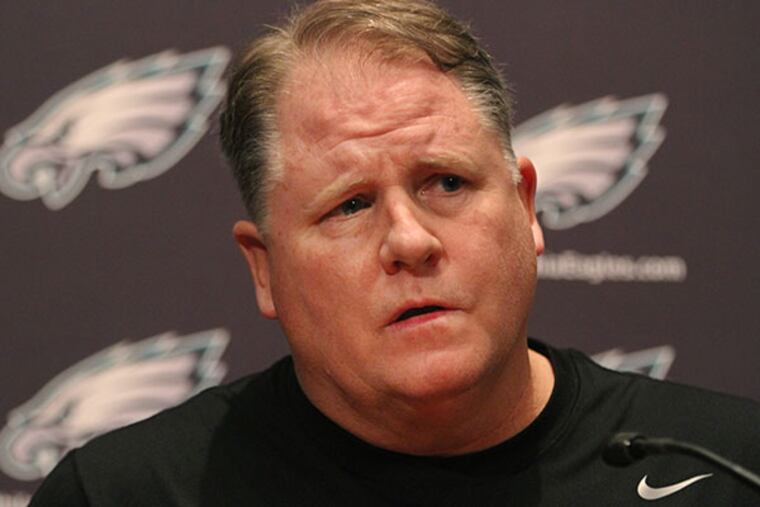Chip Kelly: Draft, not free agency, is the way to build
Chip Kelly hopes that weeks like the one the Eagles just finished become rare in Philadelphia. The spending spree that brought eight new contracts onto the payroll was necessary for Kelly to reassemble the team to his specifications, but he wants roster building to occur more during draft weekend than the first week of free agency.

Chip Kelly hopes that weeks like the one the Eagles just finished become rare in Philadelphia. The spending spree that brought eight new contracts onto the payroll was necessary for Kelly to reassemble the team to his specifications, but he wants roster building to occur more during draft weekend than the first week of free agency.
"Eventually, hopefully we're not going to be big guys in free agency," he said. "We're going to develop them from the bottom up and have our players on this [team] so we're not going out there in free agency and having to bring six, seven, eight nine guys in here."
The draft-and-develop strategy is almost universally considered the best way to build a sustainable, salary-cap-responsible roster. But it becomes a more relevant discussion in Philadelphia because of the nearly $40 million in cap space the Eagles consumed last week, and the debate about whether the team should trade for Marcus Mariota.
When Kelly said he would not "mortgage our future" for one player, it was supported by the premise that the Eagles have too many holes to surrender assets.
And what the Eagles need is a pipeline in place so that they can lock up their core players and feel comfortable that they drafted well enough to not overpay a replaceable player - whether it's one they're willing to let go or one they would sign on the free-agent market.
The risk in free agency is that there's often a reason a player becomes available - whether it's price, injury, or performance - and the information a team possesses about someone from outside the organization pales compared to the players it has developed in its own building.
"During my time in Philadelphia, we went full-scale in free agency in 2011 . . . and it's not a formula for success, when you look back historically," said ESPN analyst Louis Riddick, a former Eagles front-office executive. "I've been involved in it in my time in Washington, too, with the Redskins in the early 2000s. It's tough to do, man. It's tough to really gut your team and build it back up with free agents."
This is not to say the Eagles should sit idly during free agency. New England's Super Bowl run was helped by the addition of big-ticket free agent Darrelle Revis. Where would the Seahawks have been if they did not sign Michael Bennett or Cliff Avril for their pass rush?
Free agency works better as a form of roster correction instead of roster building. If a team misevaluates a player early in the draft or repeatedly overlooks a position, it must turn to the open market.
The $63 million contract the Eagles offered to cornerback Byron Maxwell was necessary because the team had invested a draft pick in the first three rounds on a cornerback just once since 2004. That was Curtis Marsh in 2011, and he lasted parts of only three seasons with the team.
Of the five cornerbacks on the roster, only Brandon Boykin and Jaylen Watkins came up in the Eagles' pipeline. If the Eagles were more comfortable in their internal options, Maxwell would not have been such a priority.
Look at wide receiver, where the Eagles were outbid for Jeremy Maclin. They did not respond by paying an inflated price to an inferior player because the team spent second- and third-round picks on wide receivers last year, and Kelly's plans for the position in 2015 appear built, in part, on the development of Jordan Matthews and Josh Huff.
The team's defensive line is fortified by three homegrown players acquired from 2011-13: Fletcher Cox, Cedric Thornton, and Bennie Logan. One reason the Eagles have money to spend is because their cap space is not burdened by big salaries at a premium position.
If the Eagles trade too many future first-, second- or third-round picks, they lose opportunities to draft players such as Cox, Matthews, and Logan.
"Philosophically, we're opposed to trading up for anybody right now," Kelly said. "We want to keep our picks. We want to get a lot more good players in here. We want to develop our players."
The Eagles traded up in the draft for Cox and Matthews, but they did not surrender the assets it would take to move to the top of the draft for Mariota.
Of course, Kelly's stated plan hinges on properly evaluating in the draft and developing players early in their careers. Those first-, second- and third-round picks could just as easily be players like Danny Watkins, Jaiquawn Jarrett, and Marsh if the Eagles miss.
So if Kelly wants to de-emphasize March in the future, he must thrive in April and May.
@ZBerm